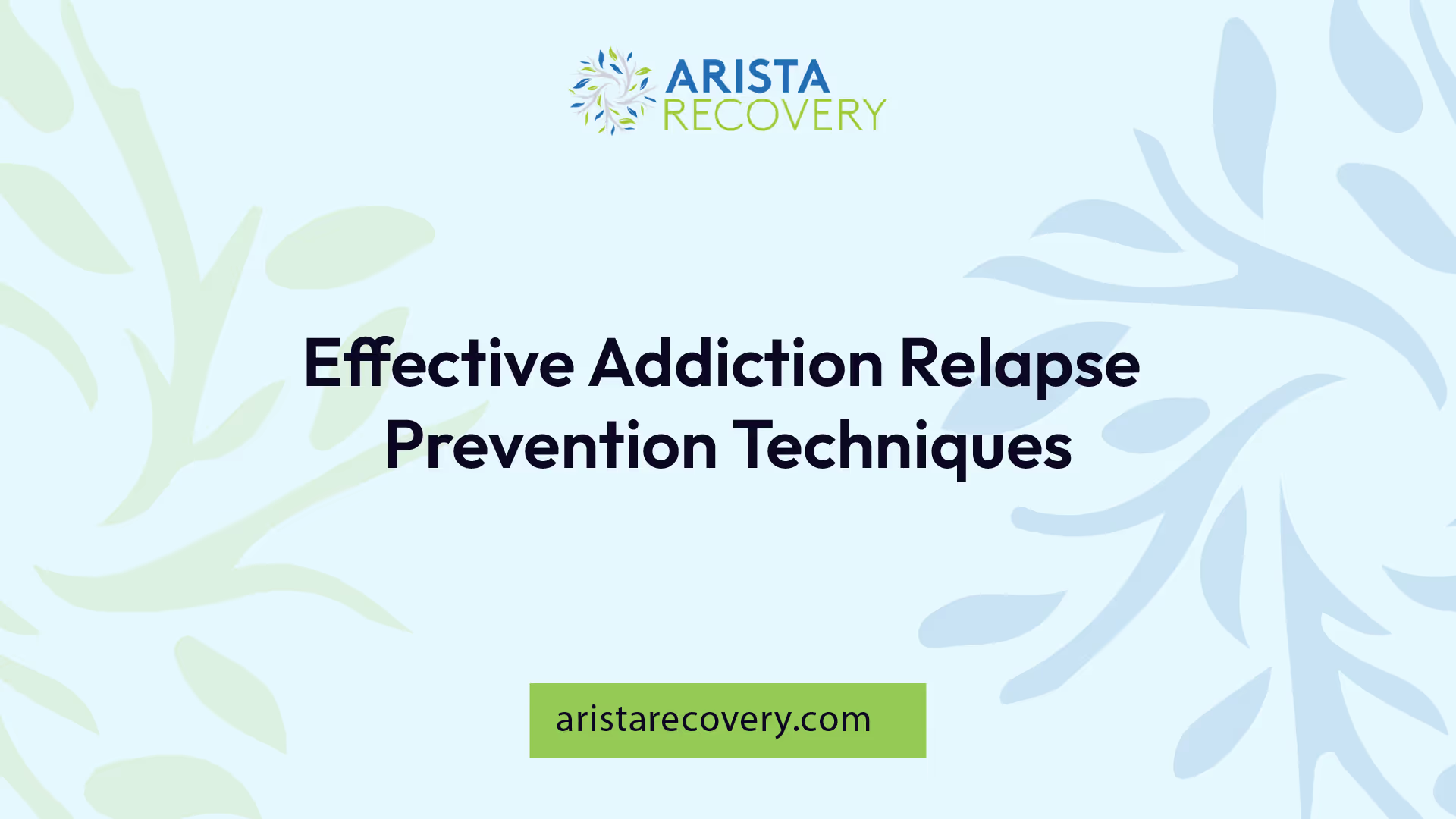Effective Addiction Relapse Prevention Techniques


Understanding Addiction Relapse
Definition of Relapse
Relapse refers to a return to substance use after a period of abstinence. It is the process by which individuals who have initially recovered from addiction start to engage in their previous harmful behaviors, ultimately undermining their recovery efforts. Understanding relapse is essential in the context of addiction recovery, as it involves a combination of personal and environmental factors that can lead to a return to substance use.
Common Relapse Triggers
Relapse triggers can vary from person to person. Recognizing these triggers is crucial for implementing effective addiction relapse prevention techniques. Some common triggers include:
Trigger TypeExamplesEmotionalStress, anxiety, depressionSocialInteractions with past usersEnvironmentalLocations associated with useCognitiveThoughts related to past use
The awareness of these triggers is vital for those recovering from addiction. For instance, stress is often a root cause of relapse and should be managed effectively to help maintain sobriety, especially in the early stages of recovery [1]. Emotional changes, such as increased secrecy or sudden mood swings, can also serve as warning signs that a relapse may be imminent. Furthermore, friends and family members can play a significant role in helping individuals recognize and cope with these relapse triggers [2].
A proactive approach involves identifying personal relapse triggers. Awareness of these triggers can aid in developing a comprehensive plan for effective management [1]. Effective counseling strategies also include creating coping mechanisms and support systems to prevent relapse among individuals struggling with addiction. For further insights into recovery methods, one can explore substance abuse intervention strategies and addiction counseling techniques.
Importance of Relapse Prevention
Understanding the significance of preventing relapse is vital for individuals navigating recovery from addiction. Effective addiction relapse prevention techniques not only support sustained sobriety but also enhance overall well-being.
Preventing Relapse Significance
Relapse prevention is an essential aspect of addiction recovery. Studies show that it significantly reduces the chances of returning to substance use by implementing structured interventions. Utilizing various strategies helps individuals manage triggers and maintain their recovery focus. Commonly adopted approaches include therapy, medication, monitoring, and peer support. Many individuals find success by combining multiple strategies tailored to their unique needs [4].
Prevention StrategyDescriptionTherapyEngages individuals in cognitive-behavioral therapy or other therapeutic techniques to develop coping skills.MedicationsInvolves the use of FDA-approved medications to reduce cravings and prevent use of substances.MonitoringImplements regular assessments through drug tests or check-ins to ensure adherence to recovery plans.Peer SupportEncourages involvement in support groups or community programs to create accountability and encouragement.
Strategies and Techniques
Effective relapse prevention incorporates diverse strategies and techniques tailored to each individual's needs. It emphasizes cognitive-behavioral therapy (CBT), acceptance and commitment therapy, or community reinforcement approaches, among others. Here are some strategies and techniques commonly used:
Incorporating these strategies into a comprehensive relapse prevention plan enhances the likelihood of sustaining sobriety and rebuilding a fulfilling life. Each individual can discover which approaches resonate most with them, making a significant difference in their recovery journey. For more information about therapy methods, consider exploring our article on addiction counseling techniques.
Identifying Relapse Triggers
Recognizing and understanding relapse triggers is essential in maintaining sobriety. By identifying personal triggers and employing effective techniques, individuals can better navigate high-risk situations and improve their chances of successful recovery.
Personal Triggers Awareness
Personal triggers refer to specific situations, emotions, or environments that may lead an individual to seek substances again. For anyone undergoing recovery, it is vital to become aware of these personal triggers. Examples of common personal triggers include:
Common TriggersDescriptionStressHigh levels of stress can lead to cravings.Environmental CuesLocations associated with past substance use.Emotional StatesFeelings of sadness, anger, or loneliness.Social SituationsInteractions with individuals who use substances.
Managing stress effectively is key to maintaining successful sobriety, especially in the early stages of recovery [1]. By identifying these triggers, individuals can develop personalized strategies to avoid or cope with them in healthy ways.
HALT Method for Prevention
The HALT method is a widely recognized acronym in the field of addiction recovery, standing for Hungry, Angry, Lonely, and Tired. Each of these states can significantly increase the risk of relapse if not addressed properly. Here’s how each element applies:
HALT ConditionStrategy for ManagementHungryEnsure regular, nutritious meals to prevent cravings.AngryPractice stress management techniques such as deep breathing or mindfulness.LonelyEngage in support groups or connect with friends to build a support network.TiredPrioritize sleep and rest to maintain physical and emotional health.
Managing these four physical and emotional conditions is crucial to prevent relapse [1]. By regularly monitoring their state and taking proactive measures—such as attending addiction recovery support systems—individuals can enhance their resilience against potential triggers. Implementing these strategies can contribute to a more stable recovery and identify when additional support, like addiction counseling techniques, might be necessary.
Managing Stress and Confidence
Effective management of stress and confidence is vital in the journey of addiction recovery. Individuals navigating this path often encounter challenges that can make these elements particularly significant.
Stress Management in Recovery
Stress is frequently a primary cause of relapse and should be regarded as a serious threat to recovery. Managing stress effectively is essential for sustaining sobriety, especially during the early stages of the recovery process. Engaging in stress-relief activities can help mitigate these risks. Common techniques include:
Maintaining awareness and integrating these stress management practices can significantly contribute to preventing relapse. For more insights, please check our article on substance abuse intervention strategies.
Balancing Self-Confidence
Self-confidence plays a crucial role in recovery but must be balanced appropriately. Overly confident attitudes can increase the risk of relapse. While it is essential to believe in one's ability to maintain sobriety, excessive confidence can lead to complacency. Individuals should remain aware that recovery is an ongoing process.
To help balance self-confidence, individuals can:
By maintaining a humble yet confident mindset, individuals can enhance their ability to navigate recovery challenges effectively. Remember to continue adhering to the relapse prevention plan and remain involved with support groups, as these factors are critical in sustaining recovery [1].
In managing both stress and confidence, individuals can fortify their defenses against relapse and promote a healthier, more sustainable path to recovery.
The Role of Social Support
In recovery from addiction, social support plays a vital role in maintaining progress and preventing relapse. This section explores how social connections can positively impact recovery and discusses the various support networks available to individuals in recovery.
Impact on Recovery
Research indicates that social support is a crucial factor in recovering from substance use disorders. Individuals with stronger social support tend to experience lower rates of substance use, greater retention in treatment, increased days of abstinence, and improved self-efficacy regarding abstinence. Higher levels of social support have also been linked to enhanced quality of life and subjective well-being, as well as reduced stress for those in recovery [5].
The following table summarizes the benefits of social support on recovery outcomes:
BenefitDescriptionLower Substance Use RatesIndividuals with strong support systems are less likely to revert to substance use.Increased Treatment RetentionStrong social networks can aid in maintaining commitment to treatment programs.Greater Days AbstinentActive social support can lead to longer periods of sustained abstinence.Enhanced Self-EfficacySocial connections boost confidence in one’s ability to remain abstinent.Improved Quality of LifeHigher levels of social support are associated with better overall well-being and life satisfaction.
Support Networks
Support networks are essential in providing the necessary help to individuals in recovery. The structure and availability of these networks can significantly influence recovery outcomes. Individuals residing in recovery homes, such as Oxford Houses, benefit from important relationships and access to resources like fellow residents and Alcoholics Anonymous (AA) groups [5].
Peer support programs, including Alcoholics Anonymous, Narcotics Anonymous, and SMART Recovery, emphasize frequent meetings, structured programs, and mentor guidance. These resources help individuals reinforce their commitment to sobriety and develop coping strategies crucial for preventing relapse.
For individuals looking for established support systems, exploring addiction recovery support systems and substance abuse intervention strategies can provide valuable insights and resources to aid in their recovery journey. Additionally, effective addiction counseling techniques can further complement the benefits of social support in enhancing recovery outcomes. Integrating trauma-informed care can also create a compassionate approach to support in recovery, as discussed in trauma-informed care for addiction.
Relapse Prevention Strategies
Implementing effective addiction relapse prevention techniques is crucial for maintaining long-term recovery. This section explores two primary strategies: therapy and skill development, and the use of medications.
Therapy and Skill Development
Therapeutic interventions are essential in managing and preventing relapse. Various forms of therapy help individuals develop coping mechanisms, improve self-awareness, and build resilience against triggers. Many individuals lose employment, family ties, and even their lives due to relapses. Here are some effective therapy options:
Therapy TypeDescriptionCognitive Behavioral Therapy (CBT)Focuses on changing negative thought patterns and behaviors.Dialectical Behavior Therapy (DBT)Incorporates mindfulness and emotional regulation skills.Motivational InterviewingHelps enhance personal motivation to change and commit to recovery.Group TherapyProvides support and accountability through shared experiences.
Skill development is equally important. Individuals can benefit from learning:
For more information on counseling techniques, you can check our article on addiction counseling techniques.
Medications for Relapse Prevention
Medications play an essential role in addiction recovery for various substances. Certain medications help reduce cravings and withdrawal symptoms, thus making it easier to maintain sobriety. For instance:
Substance TypeCommon MedicationsDescriptionAlcoholDisulfiram, Naltrexone, AcamprosateThese medications help curb cravings and reduce the likelihood of relapse.OpioidsMethadone, BuprenorphineThese medications alleviate withdrawal symptoms and cravings.
These medications have shown varying levels of effectiveness in preventing relapses [4]. Collaborating with healthcare providers to find the right medication can significantly impact recovery outcomes.
For more resources on addiction recovery, consider exploring addiction recovery support systems or looking into substance abuse intervention strategies. Being informed about trauma-informed care can also enhance one's understanding of these challenges; visit our article on trauma-informed care for addiction for more details.
References
[2]:
[3]:
[4]:
[5]:
You’re not alone in this.
When mental health challenges and addiction intersect, it can feel isolating. At Arista, we offer compassionate, evidence-based, and trauma-informed care to help you heal, grow, and move forward.
You’re not alone in this.
When mental health challenges and addiction intersect, it can feel isolating. At Arista, we offer compassionate, evidence-based, and trauma-informed care to help you heal, grow, and move forward.
Support that moves with you.
You’ve taken a brave first step. At Arista Recovery, we’re here to help you continue with best-in-class care designed for long-term healing and support.
.webp)






